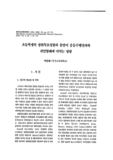

PARTNER
검증된 파트너 제휴사 자료
초등학생의 성취목표성향과 불안이 운동수행결과와 귀인형태에 미치는 영향
방대한 850만건의 자료 중 주제별로 만들수 있는 최적의 산출물을 해피 캠퍼스에서 체험 하세요 전문가의 지식과 인사이트를 활용하여 쉽고 폭넓게 이해하고 적용할수 있는 기회를 놓치지 마세요
12 페이지
최초등록일 2015.03.24
최종저작일
2003.01

-
 * 본 문서는 배포용으로 복사 및 편집이 불가합니다.
* 본 문서는 배포용으로 복사 및 편집이 불가합니다.
미리보기
서지정보
· 발행기관 : 한국초등체육학회
· 수록지 정보 : 한국초등체육학회지 / 9권 / 1호
· 저자명 : 박종태
목차
Ⅰ.서론
Ⅱ.연구방법
Ⅲ.결과 및 논의
Ⅳ. 결론
참고문헌
Abstract
초록
영어초록
This study attempted to investigate the relationship of achievement goal orientation and competitive state anxiety to motor performance outcomes and attributional patterns elementary school boys.
The subjects were 80 elementary school boys partivipated in their 5th grade. TEOSQ CSAI-2, and Attribution-Success and Failure Scale were used as instrumental tools. In order to test the hypothesis of the study, one-way ANOVA and correlation analysis were used.
The implications of the study are as follows:
1. Achievement goal orientation and competitive state anxiety had no significant effect on motor performance outcomes.
2. Achievement goal orientation and cognitive-anxiety somatic anxiety had a significant effect on attributional patterns in success situations. Task-orientation group perceived the cause as an effort factor in success situations.
3. Achievement goal orientation and somatic anxiety had a significant effect on attributional patterns in failure situations. Task-orientation group perceived the cause as an luck factor in failure situations.
4. Achievement goal orientation and self-confidence had a significant effect on attributional patterns in failure situations. Tast-orientation group perceived the cause as an luch factor and ego-orientation group perceived the cause as an effort factor in failure situations.
5. There were significant correlation between ego-orientation and cognitive-andiety, and somatic anxiety in success situations.
참고자료
· 없음태그
-
자료후기
-
자주묻는질문의 답변을 확인해 주세요

꼭 알아주세요
-
본 학술논문은 (주)학지사와 각 학회간에 저작권계약이 체결된 것으로 AgentSoft가 제공 하고 있습니다.
본 저작물을 불법적으로 이용시는 법적인 제재가 가해질 수 있습니다. -
해피캠퍼스는 구매자와 판매자 모두가 만족하는 서비스가 되도록 노력하고 있으며, 아래의 4가지 자료환불 조건을 꼭 확인해주시기 바랍니다.
파일오류 중복자료 저작권 없음 설명과 실제 내용 불일치 파일의 다운로드가 제대로 되지 않거나 파일형식에 맞는 프로그램으로 정상 작동하지 않는 경우 다른 자료와 70% 이상 내용이 일치하는 경우 (중복임을 확인할 수 있는 근거 필요함) 인터넷의 다른 사이트, 연구기관, 학교, 서적 등의 자료를 도용한 경우 자료의 설명과 실제 자료의 내용이 일치하지 않는 경우
문서 초안을 생성해주는 EasyAI
